Read
Edit
History
Notify
Share
SOON Network
SOON Network is an SVM Rollup that aims to support high-throughput deployment of SVM Layer 2 solutions on various Layer 1 blockchains. [1] [2]
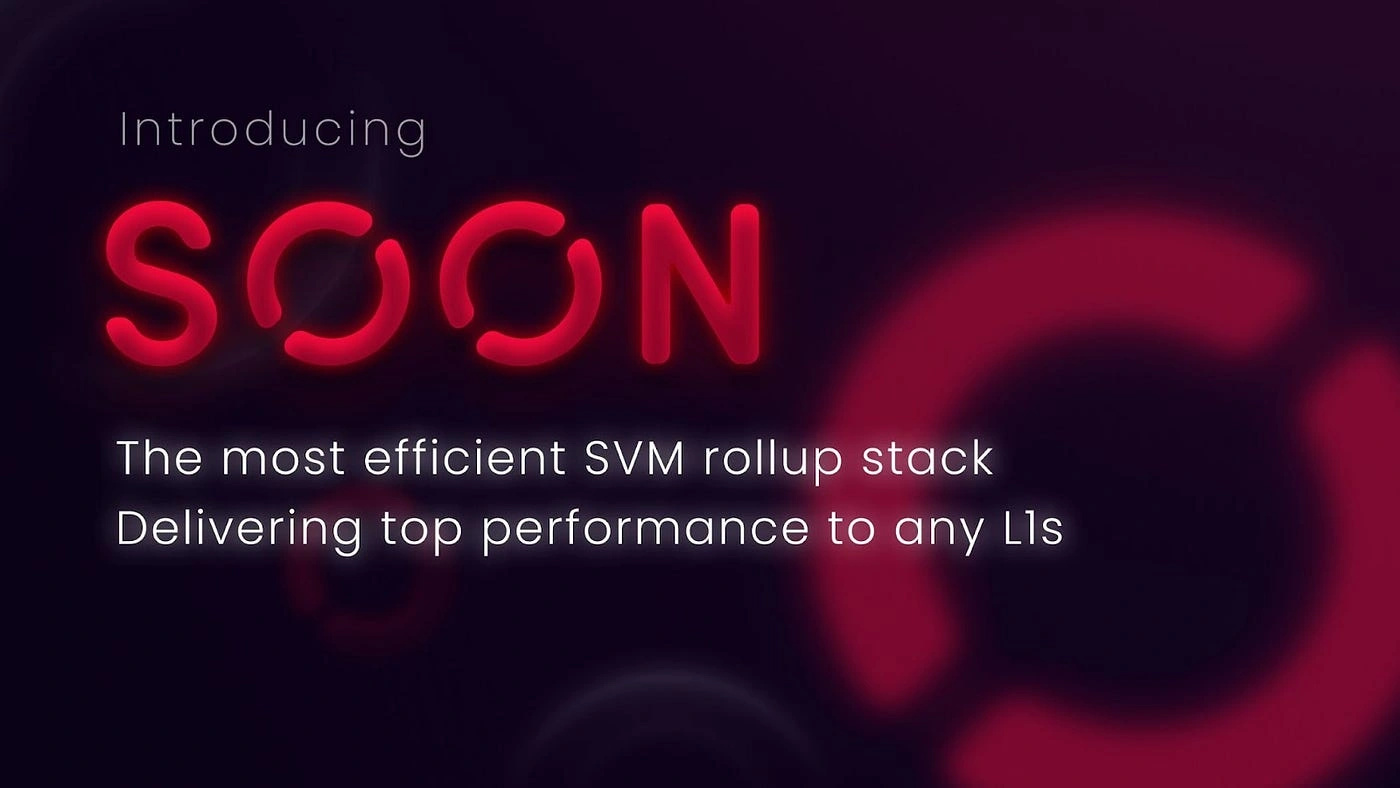
Overview
Founded in 2024 by Joanna Zeng, SOON Network is an SVM Rollup that aims to enhance blockchain adoption through its modular architecture and three core components: SOON Mainnet, SOON Stack, and InterSOON.
SOON Mainnet is a Layer 2 network on Ethereum designed to improve scalability using a decoupled SVM. SOON Stack provides infrastructure for deploying SVM Layer 2 solutions on various Layer 1 blockchains, while InterSOON facilitates cross-chain communication through Hyperlane.
The network addresses congestion in traditional rollups by leveraging parallel transaction processing with the Solana Virtual Machine. Its plans include integrating zero-knowledge proofs, improving interoperability, and open-sourcing its technology to encourage adoption. [1] [2] [3] [4] [5] [6] [7]
Products
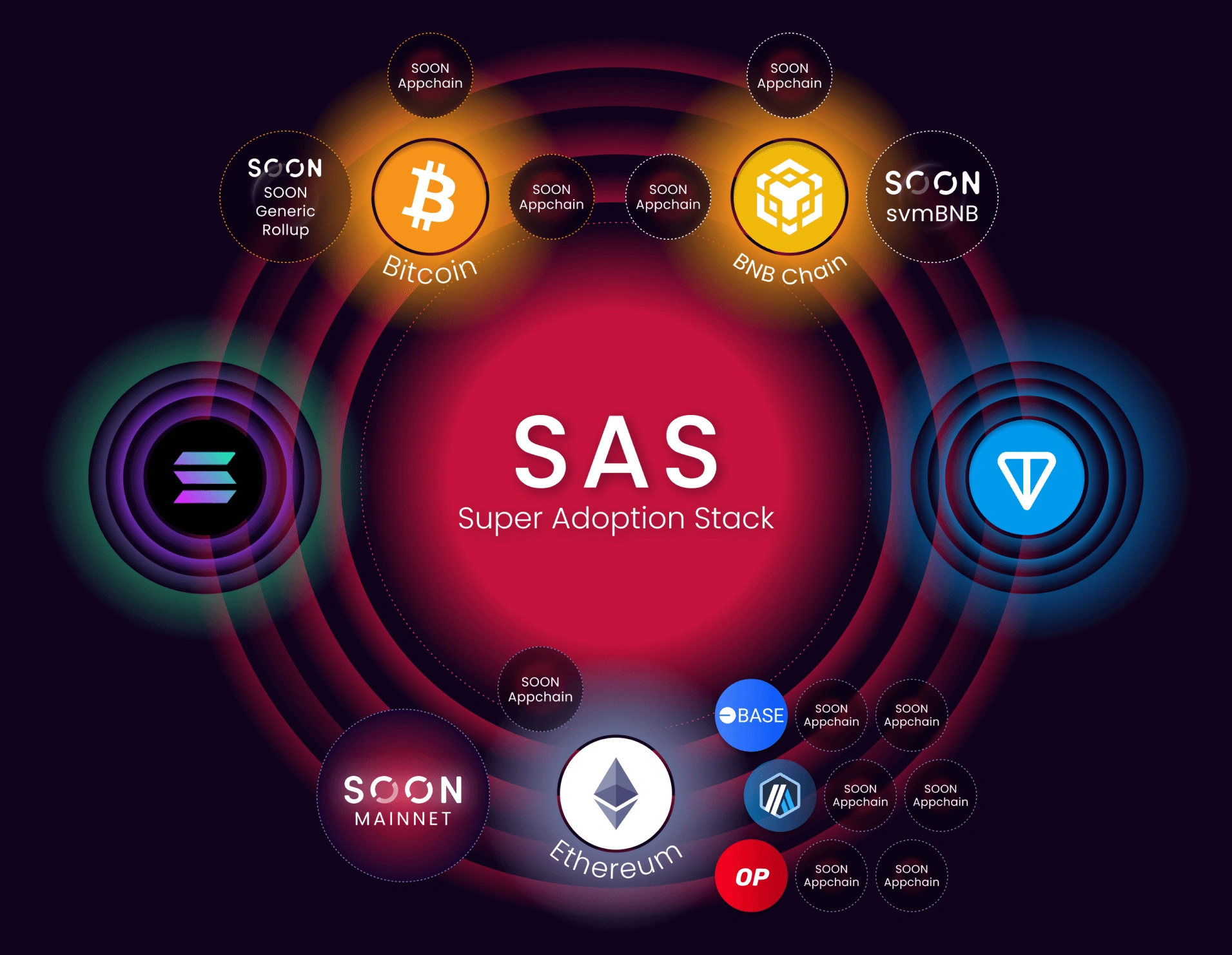
SOON Mainnet
SOON Mainnet is a general-purpose Layer 2 network on Ethereum that utilizes a decoupled Solana Virtual Machine (SVM) for its execution layer. It aims to address the constraints of the Ethereum Virtual Machine (EVM) by offering a scalable environment for developers.
The mainnet combines SVM's features, such as high transaction throughput, with Ethereum-native fault proofs, seeking to facilitate collaboration among developers from different blockchain ecosystems. [8] [9]
SOON Stack
SOON Stack is an infrastructure framework designed for deploying and running an SVM Layer 2 on various Layer 1 networks. It currently supports Ethereum as the settlement layer and integrates Avail for data availability, with plans to expand to additional L1 and DA layers.
The stack aims to simplify the deployment of SVM-based chains, offering performance and flexibility for a range of applications, including customizable consumer apps, high-performance use cases such as gaming, and transaction-heavy platforms like DeFi protocols. SOON Stack seeks to provide an efficient execution layer for diverse use cases. [9] [10]
InterSOON
InterSOON is a cross-chain messaging protocol designed to enable interaction between SOON Mainnet, SOON Stack (SOON Chains), and other Layer 1 networks. It aims to overcome limitations of traditional interoperability solutions by allowing native interoperability between blockchains without the need for duplicated assets or centralized custodians.
The protocol offers a standardized messaging layer for smart contracts and assets, facilitating more complex cross-chain interactions. Its features include liquidity preservation, as assets remain in their native form across chains, and improved performance through Decoupled SVM, which aims to reduce transaction fees and increase scalability. [9] [11] [12]
Architecture
Decoupled SVM
The Decoupled SVM in SOON Network aims to separate the Solana Virtual Machine (SVM) from the consensus layer, with the goal of enhancing scalability, performance, and flexibility. This separation allows the SVM to process transactions more efficiently and scale independently. It also aims to improve security through fault-proof mechanisms. By removing consensus components from the Solana validator structure, the architecture seeks to utilize a derivation layer to integrate data from Layer 1 (L1) into Layer 2 (L2), supporting various L1 and data availability layers for Rollups. [13] [14]
Merkilization
Merkilization in Solana faces challenges due to multiple roots per block and the absence of state root inclusion in block headers, complicating verification. SOON aims to address this by employing Merkle Patricia Tries (MPT) to manage Solana's accounts and incorporating UniqueEntry traits to embed state roots into SVM-based blockchains, updating roots every 450 slots for Layer 1 submission.
This approach seeks to improve security through inclusion and fraud proofs, enhance scalability by managing state more efficiently, and enable interoperability with Ethereum’s MPT model. Additionally, it aims to support light clients and facilitate trustless interactions between Layer 1 and Layer 2 via Merkle trees. [15] [16]
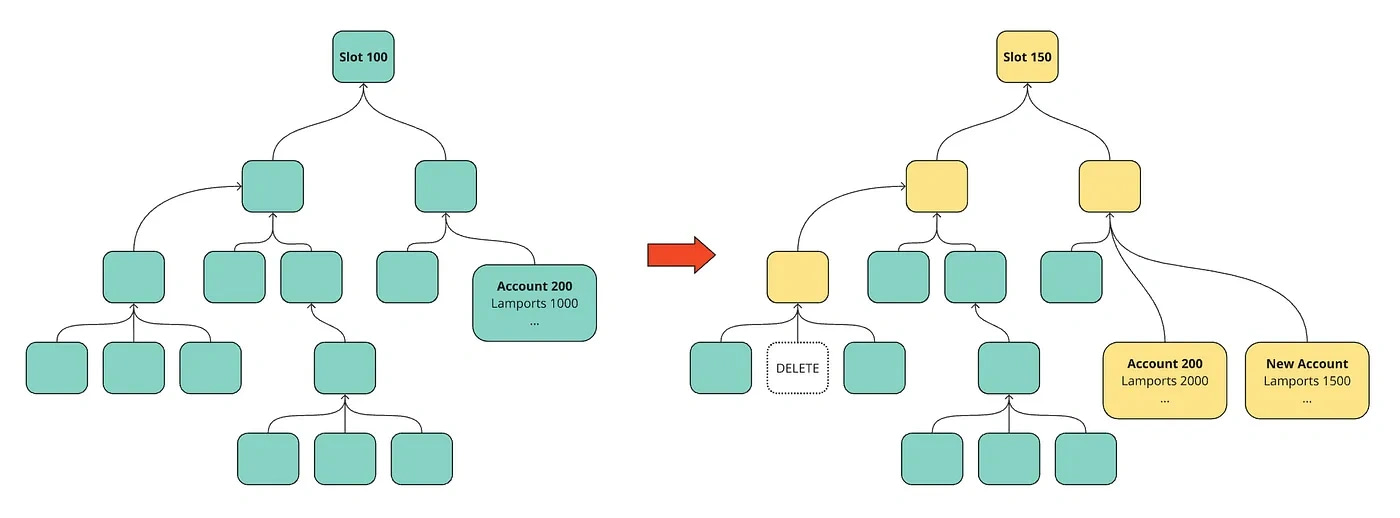
Horizontal Scaling
SOON Network aims to scale horizontally by adding nodes to distribute workloads, improving efficiency as demand increases. Its distributed TPU system processes transactions in modular components, allowing for dynamic scaling and consistent performance.
The producer-consumer architecture aims to handle transactions efficiently, with sequencers validating and queuing transactions while SVM executors process them. This design, along with conflict resolution and redundancy, seeks to ensure high throughput, fault tolerance, and minimal downtime as the network expands. [17] [18]
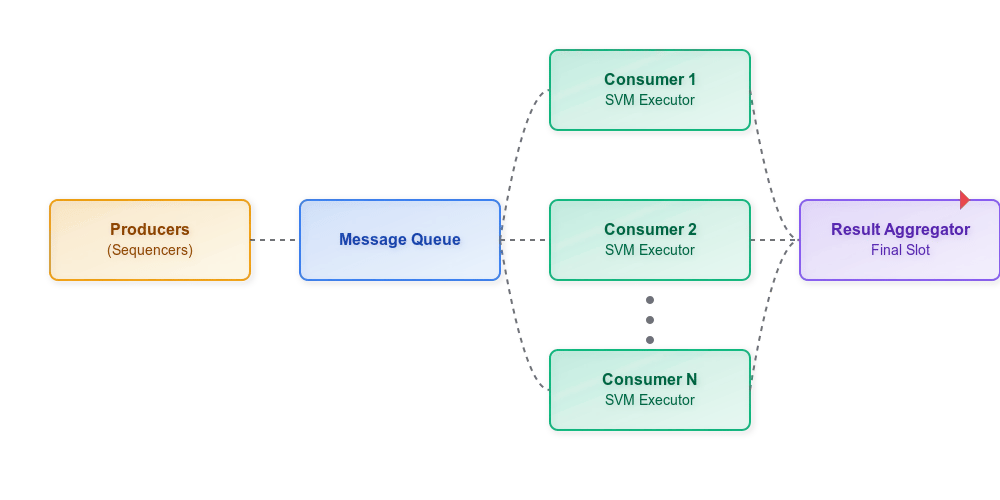
Tokenomics
SOON Network Token ($SOON)
The $SOON token is the native asset of the SOON Network, with an initial supply of 1,000,000,000 tokens and a 3% annual inflation rate. It supports activities across the ecosystem, powering dApps for both builders and users.
$SOON holders are able to vote on protocol upgrades, treasury management, and ecosystem development. The token aims to incentivize growth by rewarding builders and contributors through grants and performance-based rewards. [19]
Allocation
The $SOON token allocation is as follows:
- Community (51%): Aims to distribute tokens through a fair launch and provide rewards to long-term supporters.- Ecosystem (25%): Set aside to support the development of the ecosystem, including partnerships and strategic investments.- Airdrop & Liquidity (8%): Allocated for airdrops and ensuring liquidity on exchanges.- Foundation/Treasury (6%): Intended for long-term project sustainability, covering operational costs and future needs.- Team & Co-builders (10%): Rewards the core team and early contributors for their role in the project’s creation and launch. [19]
Utilities
$SOON is the primary utility token within the SOON Ecosystem, enabling various functions across the network. Its main utilities are:
- Governance: $SOON holders can participate in voting on protocol upgrades, resource allocation, and treasury management decisions.- Native Asset: $SOON is used for activities across the SOON Ecosystem, supporting network operations.- Incentives: Builders and projects may receive $SOON tokens as rewards for contributions to the ecosystem's growth.- Staking: Validators are required to stake $SOON to secure the network and can earn staking rewards, including a 3% annual incentive. [19]
SOON Network
Feedback
Did you find this article interesting?
Twitter Timeline
Loading
Media




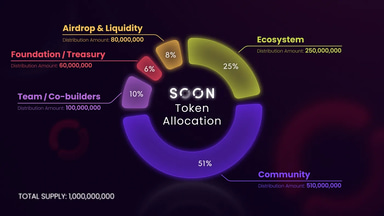
REFERENCES
[1]
[2]
[3]
[4]
[5]
[6]
[7]
[8]
[9]
[10]
[11]
[12]
[13]
[14]
[15]
[16]
[17]
[18]
[19]